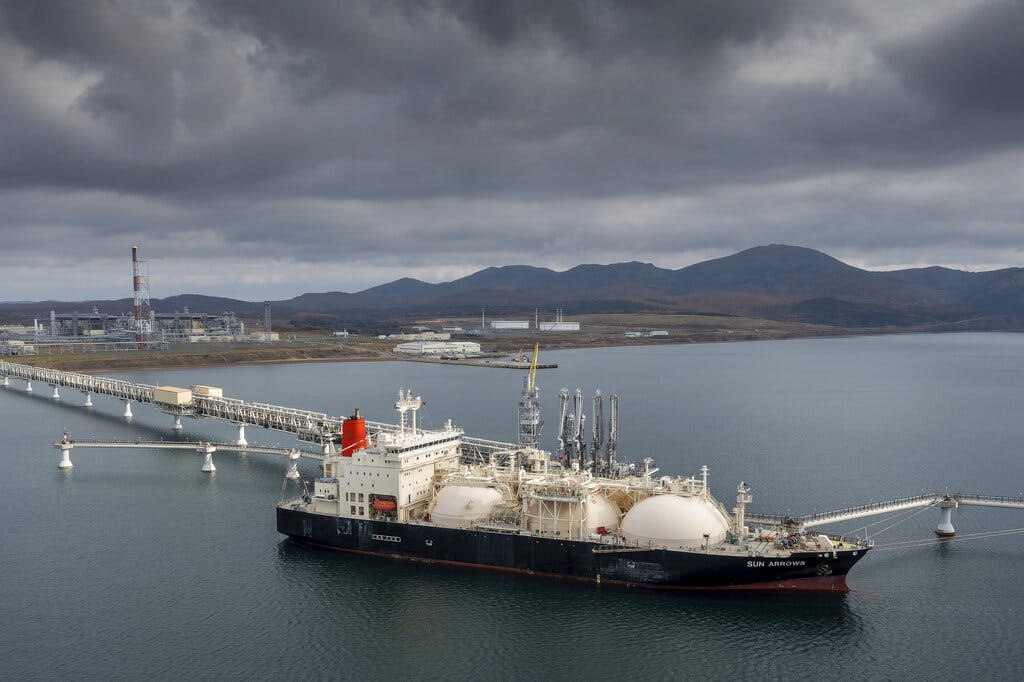For Vital Natural Gas, Europe Trades Dependence on Russia for Risk of Biden’s Green Energy Agenda
As the White House declares a ‘pause’ on new export terminals for liquefied natural gas, has Europe traded the vagaries of politics at Moscow for the vagaries of politics at Washington?

One year after replacing most of its gas imports from Russia, Europe again faces the risk of overreliance on one supplier. This time the political risk is America, underscored by President Biden declaring a “pause” on approvals of new liquefied natural gas export terminals in the United States.
Last year, America topped Qatar to become the world’s largest exporter of LNG. By sending more than 800 LNG cargoes across the Atlantic in 2022, America boosted its LNG exports to Europe by 141 percent, becoming Europe’s top LNG supplier. For pipeline gas, Norway last year topped Russia as Europe’s largest supplier. However, has Europe now traded the vagaries of politics at Moscow for the vagaries of politics at Washington?
Yes, says the American Petroleum Institute, the largest lobbying group for the oil and gas industry. It calls Biden’s move “a win for Russia and a loss for American allies, U.S. jobs and global climate progress.”
The pause looks like politics. In a clear bid to shore up support among young voters concerned about climate change, President Biden said Friday: “We will heed the calls of young people and frontline communities who are using their voices to demand action from those with the power to act.”
On the ground, the pause will not change much. The nation’s seven existing terminals, largely in Texas and Louisiana, will continue untouched. Construction work on five new terminals will continue unchanged. These new terminals could nearly double American exporting capacity by the end of this decade.
In the only change, four terminals in planning stages will have to undergo a new Department of Energy review, a process that Administration officials predict will take months. The presidential election takes place in nine months. If Mr. Biden is reelected, he will be free to end the pause.
If President Trump is elected, he is certain to end the pause. A Trump campaign spokeswoman, Karoline Leavitt, said after the announcement that Mr. Biden had “once again caved to the radical demands of the environmental extremists in his administration.” Speaking for a candidate who has vowed to “drill, drill, drill,” she said the decision to block approval of new LNG export terminals “is one more disastrous self-inflicted wound that will further undermine America’s economic and national security.”
Senator McConnell said the move could increase global reliance on Russian and Iranian energy at a time when “our allies in Europe are increasingly relying on us to keep their lights and their heat running.’’ Speaker Johnson, who represents Louisiana, a major gas exporting state, called it “outrageous” that Mr. Biden “is asking American taxpayers to spend billions to defeat Russia while knowingly forcing allies to rely on Russian energy, giving Putin an advantage.”
He noted that since Russia invaded Ukraine, “American petroleum producers have increased LNG shipments” to Europe in an effort “to prevent a catastrophic, continent-wide energy crisis and to provide an alternative to Russian energy exports.”
The White House climate adviser, Ali Zaidi, on Friday defended the pause, explaining that America “is already the number one exporter of LNG, and we remain unwavering in our commitment to support our allies and partners around the world.”
After Russia’s full scale invasion of Ukraine two years ago, the European Union radically slashed its reliance on Russian gas. Russia now supplies 12 percent of the EU’s gas imports, down from 45 percent at the start of the war. Entering this winter with its gas reservoirs 97 percent full, Europe is expected to get to spring without shortages.
However, the mixed messages from Washington remind Europe of the political risk that comes with over dependence on one supplier. Germany reportedly had contracted for one-third of the output of a now-paused project in Louisiana. Last October, in a big step toward import diversification, France and the Netherlands signed two 27-year LNG supply contracts with state-owned QatarEnergy. Deliveries are to start in 2026.
Separately, Mozambique and Nigeria are talking to the EU about LNG supplies. Azerbaijan and Norway are negotiating bigger pipeline gas deliveries. Until now, America was the favored supplier because delivery costs across the Atlantic are comparatively low, and American gas suppliers offer more flexible contracts.
When natural gas is cooled to negative 260 degrees Fahrenheit, it changes into a liquid that can be stored and shipped safely aboard specially designed ships. At a receiving terminal, LNG is reheated to return to a gaseous state and then transported by pipeline.
Climate activists object that the production, transportation, and burning of natural gas are major sources of greenhouse emissions. By building a huge export-oriented industry, they say, Washington would create substantial demand, undermining efforts to shift to renewables. On Friday, climate activist and author Bill McKibben hailed Mr. Biden for “halting the largest fossil fuel expansion in history.”
Gas defenders say that the fuel provides a bridge to a renewable future, providing electricity during seasonal drops in wind and solar production. For electricity generation, gas produces about half as much carbon dioxide as coal. This year, three-quarters of the world’s coal consumption will be in India, China, and Southeast Asia.
However, combating natural gas is a cause for climate change activists. Last year, Governor Hochul of New York, a Democrat, approved a ban on the installation of gas stoves and furnaces in new buildings. Gas and construction trade groups are suing to overturn the ban. However, similar policies have been approved by dozens of Democratic-controlled cities and local governments.

